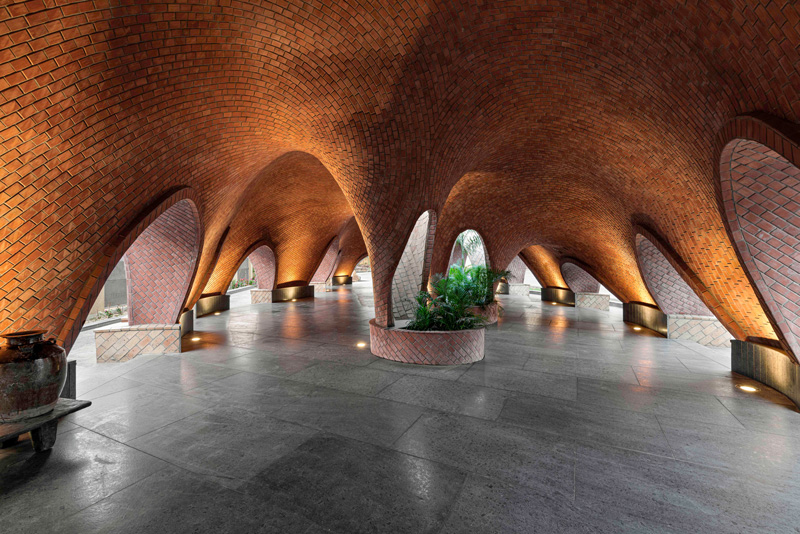
The winners of the highly anticipated Surface Design Awards have been announced at this year’s Surface Design Show, with The Tarang Pavilion in Gandhinagar, India by The Grid Architects taking the Supreme Winner prize.
An impressive number of projects, totalling over 160 entries across an unprecedented 20 countries, were entered into this year’s Surface Design Awards, which are a celebration of innovation material usage in architectural design projects around the world.
The Surface Design Awards honour outstanding achievements in both interior and exterior design, recognising innovative and sustainable projects. The trophies themselves were made by solid surface specialists Hanex UK, crafted from reclaimed scrap material it means that every award is unique and illustrates the beauty that can be created from something which was in the bin and destined for landfill.
The judging panel, headed up by Nimi Attanayake, director and co-founder ofNimTim Architects, and Charlotte McCarthy, head of interiors at Heatherwick Studio. In addition, the judging panel included Carly Sweeney, the Director of Universal Design Studio, Chris Laing, an Architectural Designer, Activist, Consultant, Founder of Signstrokes and Deaf Architecture Front and Gurmeet Sian, Architect and Founder of Office Sian, designer Kangan Arora, Sofia Steffenoni leader of Material Assemble, Lanre Gbolade architect and co-founder Gbolade Design Studio, Maria-Elena Patru director of Hill Patru and Gillian Lambert of AOC Architecture .The judging panel had the difficult job of selecting the category winners from 40 entries shortlisted across the 13 diverse categories.
The Exterior Surface of the Year award was won by Woven House in Kent by Giles Miller Studio. Judges praised its “clear craftmanship with biophilia cleverly being used out of context.” The winner in the Interior Surface of the Year category was Casta by Portugal’s Matter which garnered praise for ‘creating circularity of waste, with the collaboration of local industries, both authentic and contextual’.
The Rowe (Wells Clad Vitreous Enamel Cladding) by AJ Wells & Sons clinched the top spot in the Commercial Building Exterior category, described as ‘an interesting way to use cladding and a good way of spreading joy to the public and making the building better’. The Commercial Building Interior award, meanwhile, was won by Argentina’s Hitzig Militello Arquitectos for their Moshu Treehouse scheme, taking the prize in this category thanks to its playfulness, and its ability to ‘take a common material and make it look interesting by having a collaboration between this and other natural materials’.
India’s The Nest by Studio Lotus was triumphant among the Housing Exteriorfinalists with the judges praising its simplicity: ‘an interesting form while thinking about the landscape as well’, they said. Closer to home, the Cork House in London by Polysmiths Ltd took the top spot in the Housing Interior category. As the name suggests, cork was a key component of this project with the judges impressed by how a confident use of this material ‘contributes to the overall environment of the house, acoustically using a material known for its inherent quality as well as how it looks.’
Among the Light and Surface Exterior finalists, Tonkin Liu won the award for their Sunderdea Sunderland scheme with the judges commenting that ‘There is so much to like about this strong submission, even more so that it enhances at night’. This year’s Supreme Winners were also successful in the Light and Surface Interiorcategory with the Tarang Pavilion by The Grid Architects impressing with the way the lighting accentuated the 3-dimensional form, and the combination of the structure with natural materials proving transformative, ‘bringing the colour and the texture of the terracotta brick tiles to life’ the judges said.
The winner among the Public Buildings shortlisted was the Macam – the Armando Martins Museum of Contemporary Art. Hitzig and Militello Arquitectos gained a hat-trick in this year’s Surface Design Awards, with wins in both the Landscape and Public Realm category and for Manduca market and the Cien project in theTemporary Structure category.
The Architectural Photography award was this year won by Jeevan Jyot with an image entitled Red From Past to Present, which was praised for the way ‘it really stands out against the background, the foreground building and the biophilic element’.
Also announced at the Surface Design Awards ceremony, which was held at London’s Business Design Centre, this year’s New Talent award was won by Studio Mafa.
Supreme Winner the Tarang Pavilion which takes its name from the word for ‘wave’ in the Hindi language, is a dynamic gallery space designed to adapt and evolve to serve as an immersive exhibition platform. It was praised by the judges, as ‘a true beauty of interior spaces the interiors connect to the whole construction.’ On receiving the award The Grid Architects said they were “overwhelmed, shocked and ultimately thrilled”. The Grid Architects co-founder Snehal Suthar said, “The client wanted something which was different, sustainable and local.” Co-founder Bhadri Suthar added, “It was important to us to use local artisans, local artists and local materials and the structure is the largest of its kind in India.”
For full details of all of the 2024 award winners, please visit: https://www.surfacedesignshow.com/sda2024-winners










